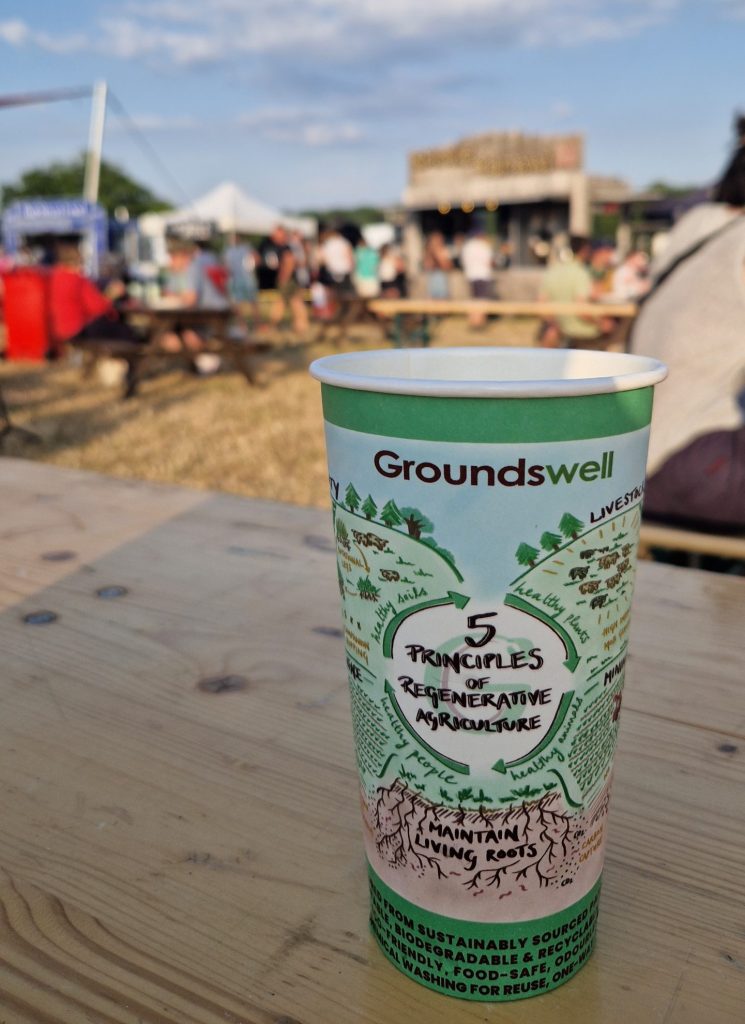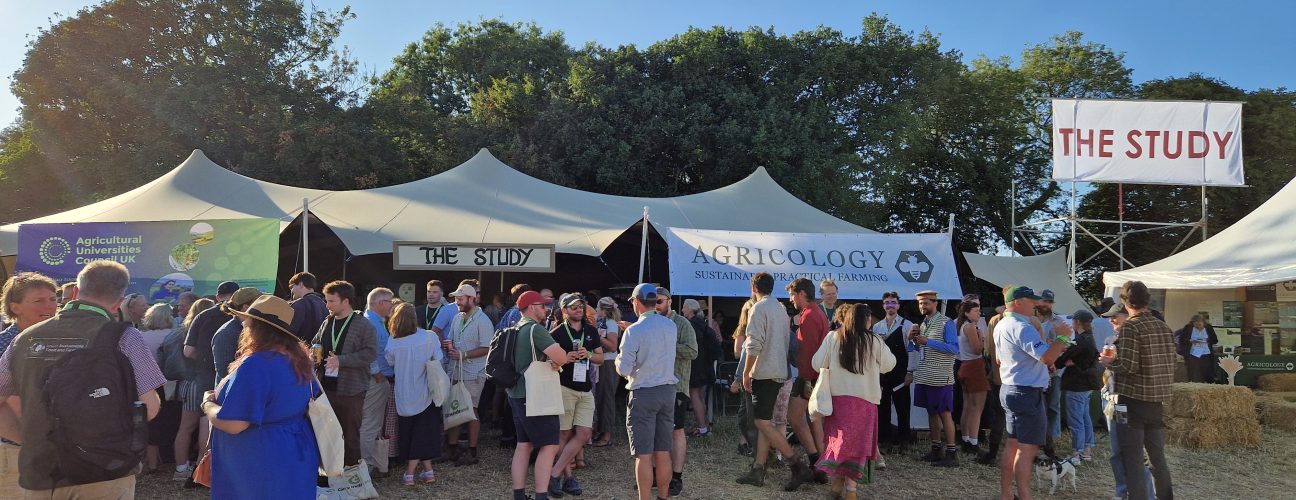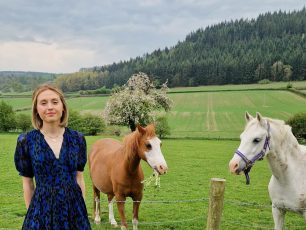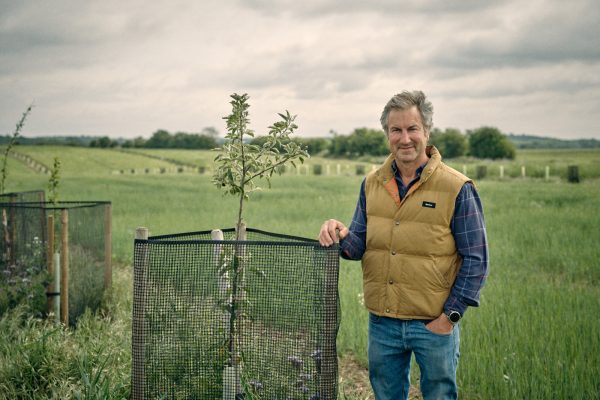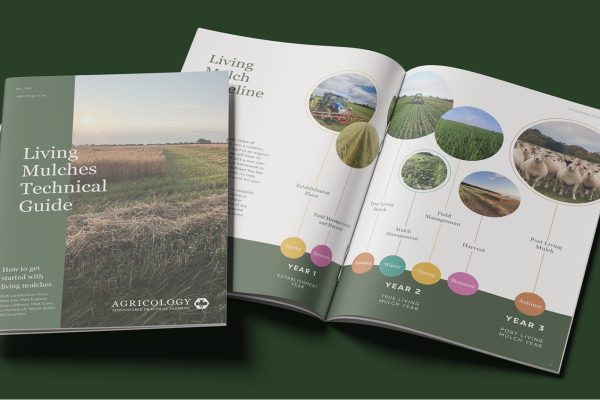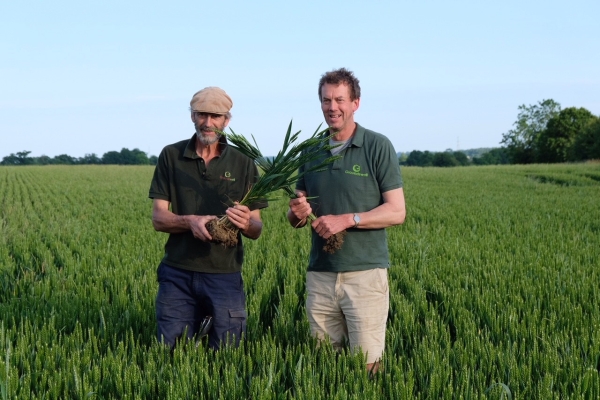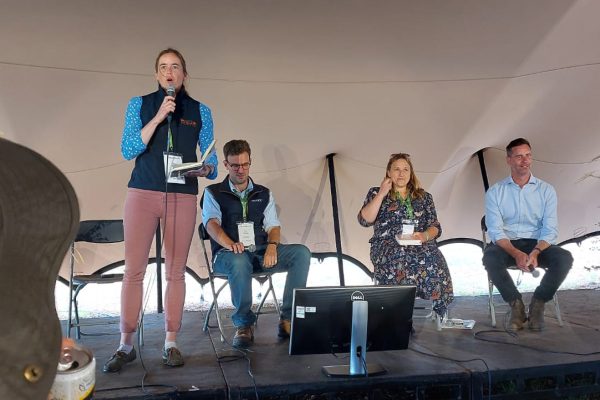Reflections on Groundswell 2025
Last week, the annual Groundswell festival once again brought together thousands of people and organisations from across the UK with a common commitment to building a better food and farming system. As in previous years, the festival offered a heady mix of practical field demonstrations, in-depth workshops and big-picture discussions, combined with the opportunity for plenty of impromptu chats and catch-ups over good food and drinks. The line-up included an array of high-profile figures including “the Father of Regenerative Agriculture” Gabe Brown, with a surprise visit from HRH The Prince of Wales who spoke eloquently on the importance of foregrounding the sustainable farming movement to help rebuild the health of our nation.
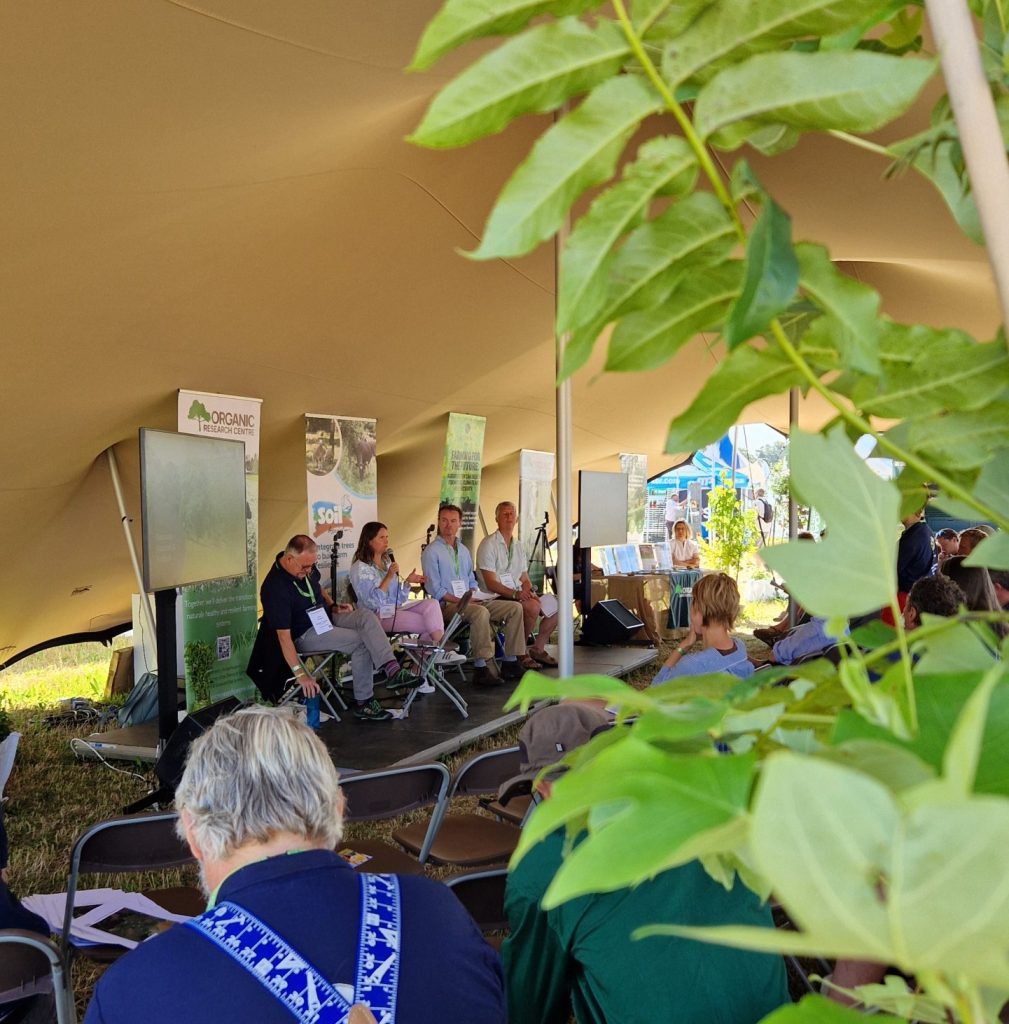
For Agricology, Groundswell represents a vital touchstone in our year, acting as a valuable space for reconnection and forming new alliances with farmers, researchers, growers, policy makers, storytellers and members of the public who are all playing their part in shaping agroecological transition. As such, I was very excited to have the opportunity to attend this event for the very first time since starting my role with Agricology earlier this year. Although I had some idea of what to expect, I was blown away by the sheer scale of the festival and the power that was generated by such an intense concentration of passion, ideas and energy.
Overview of the event
Agricology hosted six sessions in The Study tent, convening expert panels on topics including weed control, living mulches, legume cropping, regenerative stacking and reintroducing pulses into UK food systems. These diverse and practical sessions explored the challenges and opportunities farmers face when translating regenerative principles into workable practice. The speakers did a brilliant job, and we were very impressed with the quality of questions from the audience that demonstrated a particularly strong level of engagement and interest in the topics under discussion.
A personal highlight for me was our drinks reception on Wednesday evening, in collaboration with the Agricultural Universities Council and Rothschild Foundation. As the sun set over the fields, it was a pleasure to celebrate the work being done and the strengthening of relationships in a relaxed and informal setting. It was also fantastic to be able to share printed copies of our new farmer profiles produced in collaboration with the Woodland Trust, which were hot off the press! Witnessing the positive reactions of festival attendees to these resources was brilliant to see, with nearly every copy of the farmer profiles we brought to the event snapped up over the course of the two days!
In the spirit of reflection, I have pulled together three key themes that really stood out for me at Groundswell this year. I think that these themes speak not only to the current priorities and passions of the regenerative agriculture movement, but also to our core values at Agricology: the importance of farmer-led innovation, knowledge sharing, systems thinking, and deep connection to land, health, and community.
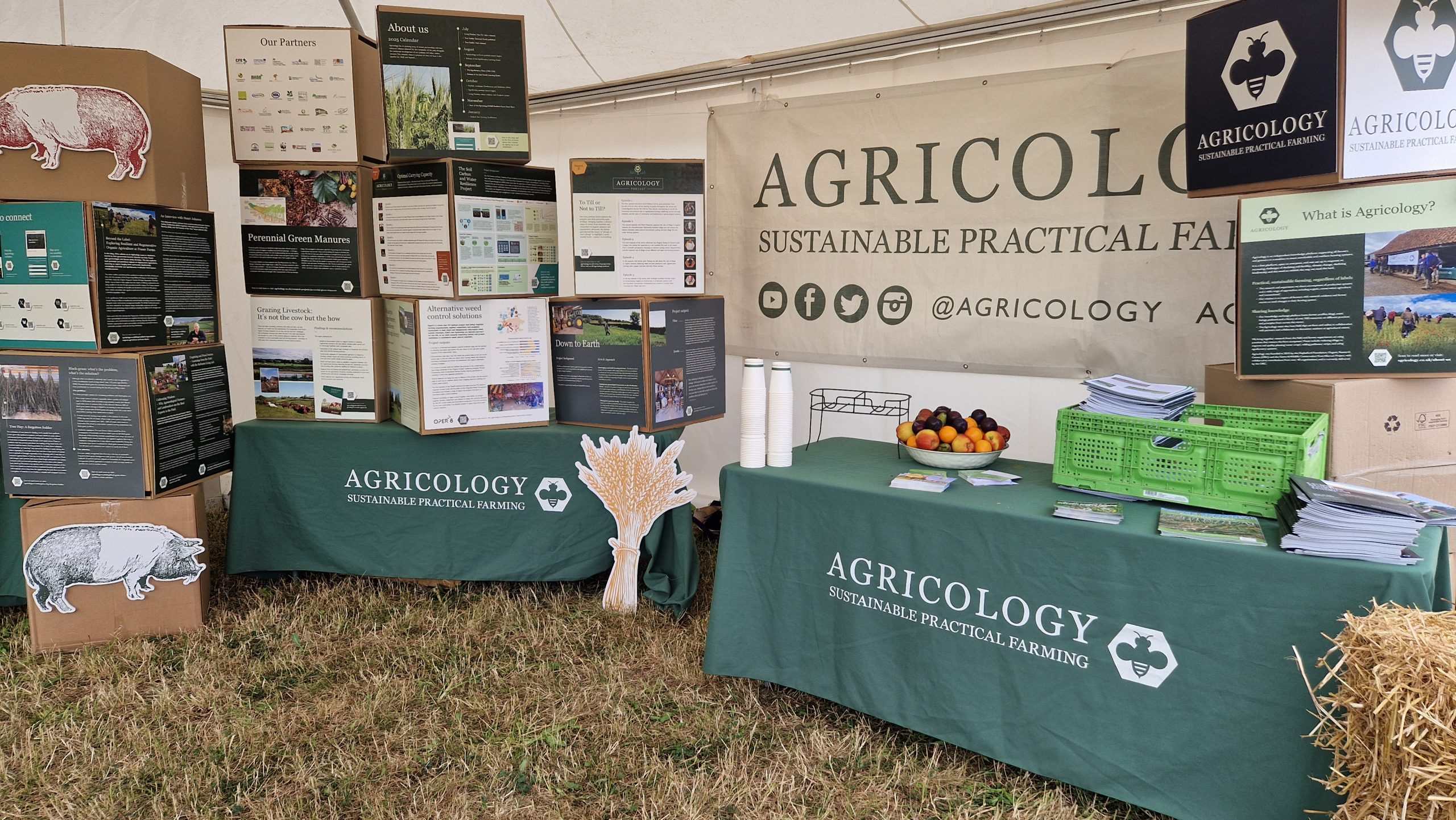
My three key take-aways
1. The vital role of storytelling in driving agroecological transition
One of the most widely echoed ideas was the power of storytelling to shape perception, build empathy, and shift food culture. In a session dedicated to the art of ‘Telling the Regenerative Story’, broadcaster and campaigner Hugh Fearnley-Whittingstall put it succinctly: “We have a greater hunger for stories about food than anything else.”
A thread which I picked up on across multiple sessions, was that in a world where consumers are increasingly disconnected from how and where their food is produced, stories offer a bridge. They make farming visible, helping people connect the dots between ecology, food, health and wellbeing. Abby Rose, creator of Farmerama Radio, spoke about how recording and sharing farmers’ stories is so important. As she put it, “Farmers’ voices are vital to retaining authenticity that drives successful storytelling…The more I have listened, the more I have begun to empathise… and understand how things can shift for the better.”
Storytelling also has economic power. In a conversation dedicated to ‘Reframing our Relationship with Seed’ Josiah Meldrum from Hodmedod’s Wholefoods shared how reconnecting people to the story of carlin peas (an “unimproved” heritage variety with deep historical roots) could act as a powerful tool, helping to build new markets for this nutritious and versatile crop (James Bucher talks about growing carlin peas for Hodmedod’s in one of our new farmer profiles). In the same session, commercial vegetable and seed grower Holly Silvester was keen to stress the importance of storytelling in preserving the history and knowledge of ancient seed varieties, which are frequently not recorded and thus in danger of being lost as generations pass on. In the UK we have also lost the tradition/ traditional practices of processing, preparing and eating seeds, beans and pulses in a way that enhances nutrient bioavailability.
This theme also ran through sessions dedicated to nutrition and health. For example, in the Soil Tent, speakers explored how telling better stories about nutrient-dense food can help reshape dietary habits and public health outcomes. In the context of organic food, Eric Smith (Edacious) noted that if you can’t tell a story about the food, consumers won’t pay more for it, however healthy it might be. Thus, promoting the sharing of stories and knowledge has real implications for both the environment, culture and human wellbeing. When consumers know the story of food, the farm, and the people behind it, the food on their plate becomes more than cash and calories.
For Agricology, this is a crucial takeaway. As we continue to support farmer-to-farmer knowledge exchange, we also recognise the need to share stories with wider publics, which is indeed what we try to do through our ever-popular farmer profiles. Stories humanise farming and hold the ability to elevate invisible labour. They remind us that at the core, food is about relationships, to each other, to land, and to the future.

2. How the regenerative agriculture movement is turning principles into practice
The second take-away for me was that Groundswell is not just about ideas. It is about what happens when you try to put those ideas into practice on a real farm, with real weather, real weeds, and real financial pressures. The festival proved to me that regenerative agriculture is not just an esoteric philosophy or set of values, but a living and dynamic movement. This year’s programme was packed with sessions focused on practical innovation, from how-to guides on living mulches and low-input legumes to new approaches to weed control, nutrient management, and accessing funding.
Throughout Agricology’s sessions, farmers shared personal insights into how they are navigating the complexities of issues like glyphosate reduction and integrated weed management. Others explored how legume-based cropping systems can build fertility, reduce inputs and diversify income. An informative conversation on regenerative stacking with Dave and Stuart Oates highlighted how enterprises like agroforestry, grazing and horticulture can be integrated to build resilience and spread risk, while those working with livestock described how digital tools like boluses and virtual fencing are enabling new business models.
Elsewhere in the festival, safari walks offered the chance to get out and see conservation farming techniques in action, while the exhibitors’ field was testament to a vast array of exciting new machines and technologies, from tractors to veg box management software and innovative fungi-dominated fertiliser pellets. The stands demonstrated how cutting-edge research and trials are being connected to business and entrepreneurial spirit to drive forward real change on the ground. For me, this reinforced the idea that regenerative agriculture is not a fixed recipe, but a flexible, evolving framework rooted in observation, learning and place-based decision-making.
Across the Groundswell site, I saw how farmers are taking principles and adapting them to their contexts, and how research, policy and markets play a vital role in supporting this work.
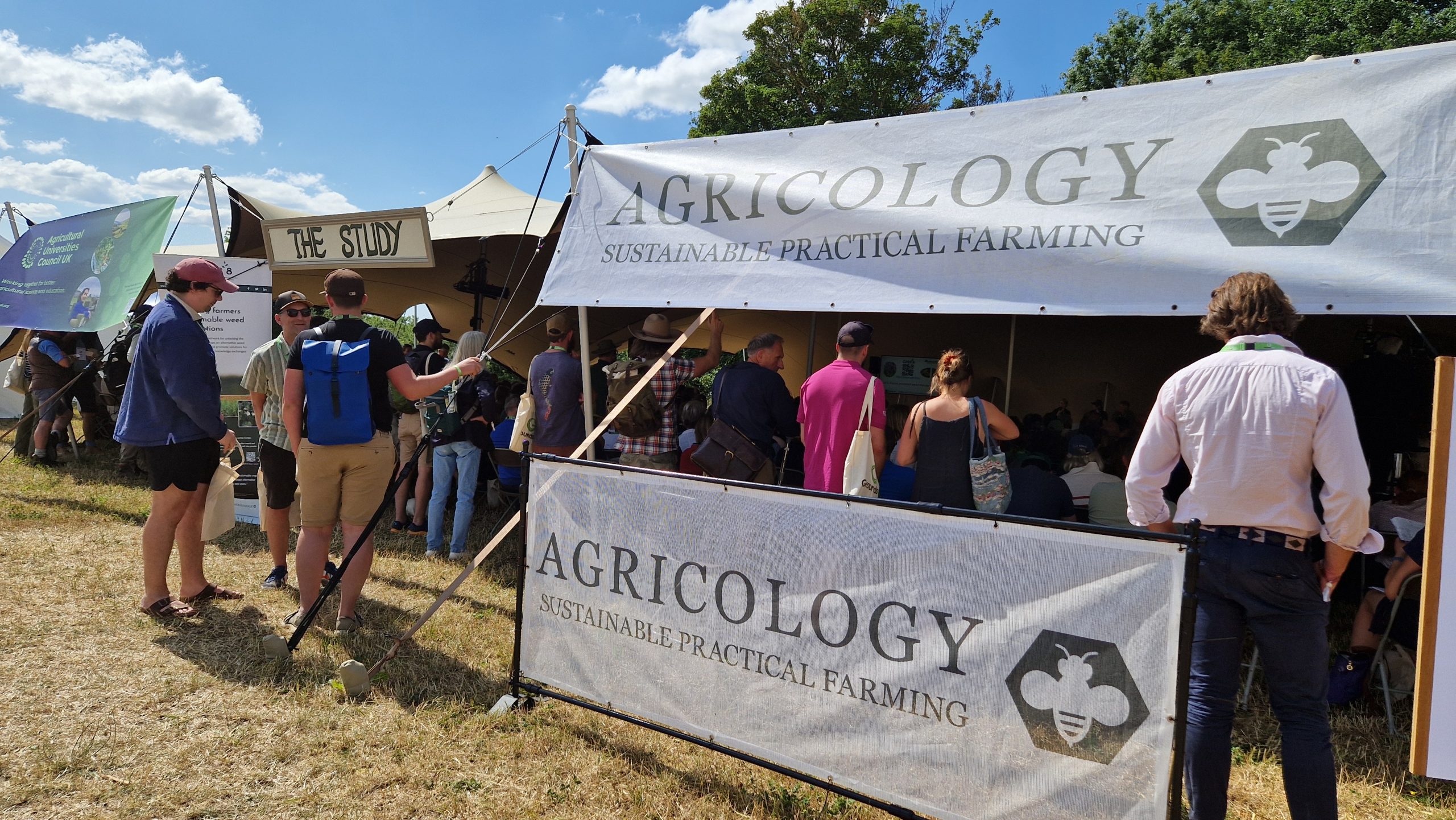
3. When the whole really is more than the sum of its parts
Another phrase that particularly resonated with me was “The whole is far more than the sum of its parts.” These words were used by Matthew Adams (GRFFN CIC) in a discussion about the benefits of taking a whole food-first approach to nutrition but quickly became a metaphor for the event itself. What makes Groundwell so powerful as an event is how all its elements and people combine in a way that is incredibly synergistic. There is a special kind of magic in walking from a session on companion cropping trials, past a hedge-laying demo, to a tasting of heritage wheat bread. The breadth of knowledge and experience, encompassing the scientific, practical, emotional, and ecological aspects of farming, creates an environment where new connections can flourish.
This spirit of interconnectedness was visible in sessions ranging from seed sovereignty to conservation grazing. Alex Crawley, co-founder of Grazing Management, highlighted how their work to reintroduce livestock to long ungrazed sites isn’t just about land management, it’s about social regeneration too. Engaging communities, training volunteers, and building local trust are as essential to their success as the breed of cow or their digital fencing technology. This is exactly why events like Groundswell are so important – as much as we value data and evidence, it is often informal conversations that spark ideas, build trust and lay the groundwork for collaboration. Groundswell is where policy advisors sit on straw bales next to organic bakers, and where young farmers and retired professors meet in the dance tent.
Much like a mycorrhizal network, it’s not just about what each individual brings, but what emerges in the space between – a living system of mutual support and transformation which is infinitely more than the sum of its parts!
Here at Agricology we are (as always) very grateful to the organisers who make it all happen, and to the Cherry Family for hosting the festival on their beautiful farm. Thank you to everyone who participated in the sessions, attended our reception, and came up to speak to us at the stand!
Many conversations were had with people from across the entire food and farming sector, each one offering a useful new idea or piece of knowledge to inform and inspire going forward. For others and me, Groundswell embodies the paradox of being simultaneously incredibly energising and somewhat exhausting – a whirlwind of ideas, conversations and inspiration that leaves you both elated and in need of a lie-down. Personally, the festival was a powerful reminder that socio-ecological regeneration thrives through story, solidarity and a commitment to grounded practice.
I can’t wait to do it all again next year!
